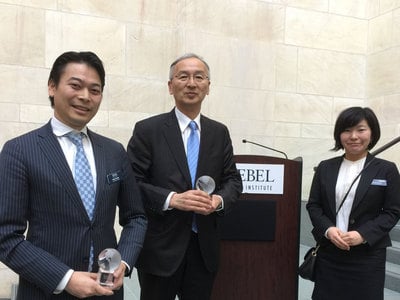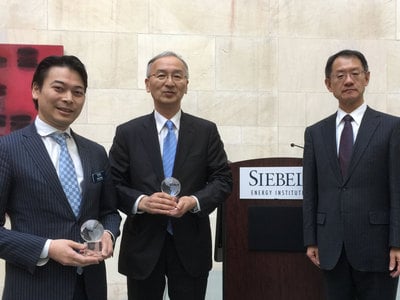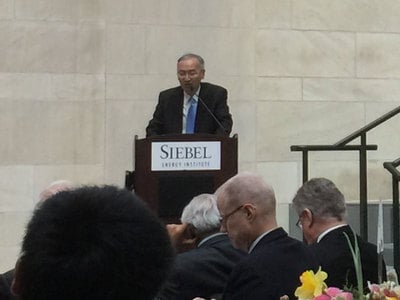Earn 2 research grants from the Siebel Energy Institute in connection with improving the reliability of energy systems
【Awards and Commendations】Earn 2 research grants from the Siebel Energy Institute in connection with improving the reliability of energy systems
On 3rd March 2017, Professor Shigehiko Kaneko, Assistant Professor Akane Uemichi, Department of Mechanical Engineering, Associate Professor Kenji Tanaka, Department of System Innovation( at that time)/ Technology Management for Innovation (Current), Earn 2 research grants from the Siebel Energy Institute in connection with improving the reliability of energy systems.
● Name, affiliation
"Development of a Novel Scheme for Introducing Distributed Generation Systems Based on Business Continuity Planning Considering Disaster Risks"
Shigehiko Kaneko (Lead Researcher) / Professor, Department of Mechanical Engineering, Graduate School of Engineering, The University of Tokyo
Akane Uemichi (Collaborator) / Assistant Professor, Department of Mechanical Engineering, Graduate School of Engineering, The University of Tokyo
"Blockchain-based Smart Metering and Electricity Trading"
Kenji Tanaka (Lead Researcher) / Associate Professor, Department of System Innovation, Graduate School of Engineering, The University of Tokyo
Annette Werth (Collaborator) / Department of System Innovation, Graduate School of Engineering, The University of Tokyo & Sony Computer Science Laboratory
Yasuhiro Takeda (Collaborator) / OPT Incubate
● Name and brief explanation of the prize that was awarded
The Siebel Energy Institute is an international consortium aiming at innovative collaborative research for the development of science and technology in the energy field, founded by the Thomas & Stacy Seabel based on research funds of $ 10 million. It consists of the following eight research institutes; Carnegie Mellon University, Ecole Polytechnique, MIT, Torino Polytechnique, Princeton University, University of California Berkeley, Illinois University Urbana, and the University of Tokyo. This research organization is supported by the advisory board of the industry, the initial members of that board are advanced companies related to energy such as Pacific Gas & Electric, Honeywell, C3 Energy, etc. In 2017, 14 research proposals were selected, please refer to the following URL.
Http://www.siebelenergyinstitute.org/2017-research-grants/
● About the awarded research and activities
The Siebel Energy Institute awarded research grant funds to the following two research proposals: "Development of a Novel Scheme for Introducing Distributed Generation Systems Based on Business Continuity Planning Considering Disaster Risks"*by Professor Shigehiko Kaneko and "Blockchain-based Smart Metering and Electricity Trading" ** by Professor Kenji Tanaka. In the research grant program by Siebel Energy Institute that began in 2015, research proposals related to energy systems are selected from research proposals proposed by researchers belonging to member universities. In 2017, 14 themes were selected out of 37 research proposals. This time, the amount of research funding awarded by the Foundation is 50,000 dollars.Selected research topics are related to not only electricity infrastructure security but also development of algorithms expected to contribute to toughening of cyber security such as the Internet etc. which became one of irreplaceable infrastructure right now. It is expected that further development of research proposals will be made with this research grant fund as seed money.
* "Development of a Novel Scheme for Introducing Distributed Generation Systems Based on Business Continuity Planning Considering Disaster Risks"
Business continuity planning (BCP) is one of the important risk management strategies to enhance resilience of business operations and local communities in the case of disaster. In this research, we focus on introducing distributed generation equipment as a system for enhancing the effectiveness of BCP from the viewpoint of energy supply, including electricity and heat. Our research aims to (1) develop a suggestion scheme to optimize planning for energy system configuration including distributed generation equipment and cogeneration (CGS), (2) improve an economical index to judge whether a customer, who is interested in installing BCP equipment, should introduce distributed generation equipment considering the disaster risks, and (3) suggest an evaluation scheme for an appropriate amount of the governmental subsidy for the introduction of distributed generation equipment based on BCP. Introductory planning of the distributed generation equipment for a target building will be optimized by modeling the energy generation equipment and the disaster risks, then the whole energy demand-supply will be analyzed via mixed integer linear programming. A “disaster-risk-weighted damage inequality” as a decision scheme for installing a CGS will be improved from the viewpoint of practical use. Finally, Net Present Value of the energy system will be calculated to evaluate the governmental installing subsidy, thus contributing to the development of a resilient energy infrastructure with a reasonable, appropriate, and quantitative introductory planning and subsidy system.
** "Blockchain-based Smart Metering and Electricity Trading"
The future electricity grid will be a two directional system with billions of consumers and prosumers interacting with each other. Micro-grids, including batteries, solar, or wind generation modules, will need to be interconnected using distributed energy management software. Being able to conceive a secure and decentralized control and billing system adapted to these autonomous, peer-to-peer exchanges is one of the biggest challenges of this century. We propose to use Blockchain as an underlying platform because could perfectly fit the requirements of a decentralized digital currency that provides bidirectional and transparent rewards to prosumers and that is independent from Feed-In tariffs by guaranteeing a given amount of energy and then converting it into fiat money on an open electricity market. Blockchain 2.0 also enables smart contracts that can further transform the electricity sector as it enables micro-transactions not only between micro-grids but also appliances. It provides effective incentives for subsystems to adapt to changing conditions that will contribute in cutting peak demands and contribute in solving the demand-response matching issue.
● Future resolutions / impressions
We are honored to receive such an award this time. We would like to further develop the research based on the grant.



You May Also Like
These Related Stories
Kasidit TOPRASERTPONG, Department of Electrical Engineering and Information Systems won 2018 Siebel Scholars in Energy Science
Workshop on “Energy” for enterprise


